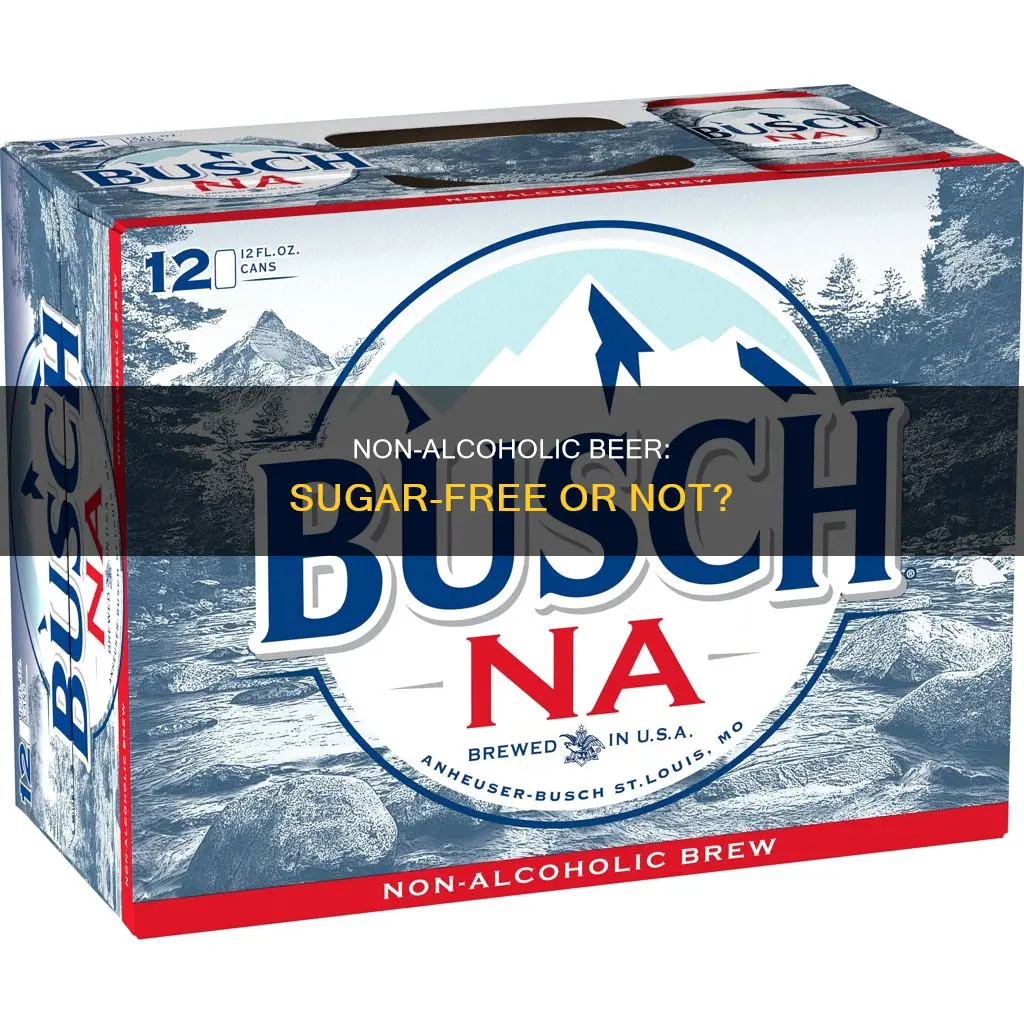
Non-alcoholic beer is a great alternative for those who want to cut down on their alcohol intake. However, it's important to note that it's not completely free of alcohol or calories. In fact, non-alcoholic beers often contain more sugar than their alcoholic counterparts, as sugar is added to improve the taste after the alcohol is removed. This makes them unsuitable for those following a low-carb or low-sugar diet.
What You'll Learn
- Non-alcoholic beer is often higher in sugar than regular beer
- The sugar in non-alcoholic beer comes from the malted grains used
- The average sugar content of non-alcoholic beer is 1.5g per 100ml
- Non-alcoholic beer is not suitable for those on a low-carb or low-sugar diet
- The NHS recommends that adults consume no more than 30g of sugar per day

Non-alcoholic beer is often higher in sugar than regular beer
The amount of sugar in non-alcoholic beer varies depending on the brand. For example, a 330ml bottle of Heineken "0.0" (0%) has 4.3g of sugar, while a 330ml bottle of Peroni Libera (0%) has 10g of sugar.
The NHS recommends that adults consume no more than 30g of sugar per day. Drinking non-alcoholic beers can quickly exceed this limit, as a single pint of a beer like Cobra "Zero" (which has 3.5g of sugar per 100ml or 19.6g per pint) can account for the majority of your daily sugar allowance.
In addition to sugar, non-alcoholic beers also tend to be higher in carbohydrates than regular beers. This is because, unlike most alcoholic beers, they usually contain sugar, which is a type of carbohydrate.
While non-alcoholic beer may be higher in sugar, it is still a healthier option than regular beer in some ways. For example, non-alcoholic beer is lower in calories and alcohol, which can provide various health benefits such as improved sleep, better muscle recovery, and a reduced risk of cancer.
Beer and Diabetes: Is There Sugar in Beer?
You may want to see also

The sugar in non-alcoholic beer comes from the malted grains used
Non-alcoholic beer contains no alcohol, but the amount of carbohydrates can be higher than in regular beer. This is because non-alcoholic beers contain sugar, which is often added to improve the flavour once the alcohol has been removed.
The sugar in non-alcoholic beer comes from two sources: malted grains and added sugars. The malted grains used in the brewing process include barley and wheat. These grains are naturally high in sugar, which is necessary for the fermentation process. During fermentation, the yeast feeds on the sugars in the grain, producing alcohol and carbon dioxide. After fermentation, some sugar remains in the beer, contributing to the sweet taste.
Additionally, sugar is often added to non-alcoholic beer to enhance its flavour. This added sugar increases the carbohydrate content of the beer, which can be higher than that of regular beer. The specific type of sugar added can vary, with some beers containing lactose, a milk sugar that adds body and sweetness.
The sugar content of non-alcoholic beer can range from trace amounts to around 5g per 100ml. On average, there is about 1.5g of sugar per 100ml, making non-alcoholic beer lower in sugar than many soft drinks such as cola, orange juice, and tonic water.
Beer and Sugar: What's the Connection?
You may want to see also

The average sugar content of non-alcoholic beer is 1.5g per 100ml
Non-alcoholic beer is a great alternative for those who don't want to consume alcohol. However, it's important to note that it's not completely calorie-free. The average sugar content of non-alcoholic beer is 1.5g per 100ml, which is lower than that of cola, orange juice, and tonic water.
Non-alcoholic beer typically has more sugar than regular beer, as sugar is often added to improve the taste after the alcohol is removed. The amount of sugar in non-alcoholic beer can vary, with some having as little as 0.1g of sugar per 100ml, while others may have up to 4g. For example, a 330ml bottle of Peroni Libera Alcohol Free contains around 10g of sugar.
It's important to monitor your sugar intake, as excessive sugar consumption can have negative health effects. The NHS recommends that adults consume no more than 30g of sugar per day. Drinking just one pint of a beer with a higher sugar content, such as Cobra "Zero" (3.5g of sugar per 100ml), can quickly add up to your daily sugar allowance.
When choosing a non-alcoholic beverage, it's advisable to opt for those with natural sugars, such as kombucha, which is typically made using cane sugar and rarely contains added sugars. Additionally, sparkling teas and low-calorie sodas with short ingredient lists are good options.
While non-alcoholic beer may have more sugar than its alcoholic counterpart, it usually has fewer calories. For instance, Bavaria alcohol-free wheat beer has 3.6g of sugar, while Hoegarden's full-strength wheat beer has just 0.1g of sugar. However, Bavaria's overall calorie content is only 27kcal, compared to Hoegarden's 58.6kcal.
In summary, while non-alcoholic beer typically contains more sugar than regular beer, it still tends to be lower in sugar than many soft drinks. However, it's important to be mindful of the sugar content and opt for lower-sugar options when possible, especially if you're following a low-sugar or low-carb diet.
Goldberg Beer: Sugar Content and Nutritional Facts
You may want to see also

Non-alcoholic beer is not suitable for those on a low-carb or low-sugar diet
Non-alcoholic beer contains more than twice the carbohydrates of regular beer, mostly in the form of added sugar. This added sugar increases the calorie content of non-alcoholic beer, making it unsuitable for those on a low-carb or low-sugar diet.
The sugar in non-alcoholic beer is added to improve the taste after the alcohol has been removed. On average, there is around 1.5g of sugar per 100ml of non-alcoholic beer, which is lower than cola, orange juice, and tonic water. However, the sugar content can vary between different non-alcoholic beers, with some containing up to 10g of sugar per 330ml bottle.
The NHS recommends that adults consume no more than 30g of sugar per day. Drinking non-alcoholic beers can quickly exceed this recommended amount, as a single 330ml bottle of some non-alcoholic beers can contain nearly a third of the recommended daily sugar intake.
Beer's Sodium and Sugar Content: What You Need to Know
You may want to see also

The NHS recommends that adults consume no more than 30g of sugar per day
Sugar can be addictive and can cause cravings, binge eating, rapid weight gain, and disease. Excess sugar consumption has been linked to obesity, type 2 diabetes, heart disease, certain cancers, and tooth decay. It is important to note that not all sugar is bad. Sugar that occurs naturally in fruits and vegetables is absolutely fine and should not be cut down.
To optimise health, it is best to avoid foods that contain added sugars. The Dietary Guidelines for Americans recommend limiting calories from added sugars to less than 10% of total calories per day. This is supported by the American Heart Association, which recommends that men consume no more than 9 teaspoons (36 grams or 150 calories) of added sugar per day, while women should consume no more than 6 teaspoons (25 grams or 100 calories) per day.
Non-alcoholic beer is often higher in carbs and sugar than its alcoholic equivalent. This is because alcohol contains no carbohydrates, and non-alcoholic beers usually contain sugar. The sugar in beer is considered a “free sugar”, and just one pint of non-alcoholic beer can account for the majority of the recommended daily allowance of sugar. For example, a pint of Cobra "Zero" contains 19.6g of sugar, which is more than half of the recommended daily limit.
While non-alcoholic beer is a good option for those looking to reduce their alcohol intake, it may not be the best choice for those trying to lower their daily sugar or calorie intake.
Busch Beer: Sugar Content and Nutritional Facts
You may want to see also
Frequently asked questions
Yes, NA beer does contain sugar. In fact, it often contains more sugar than regular beer. This is because, unlike alcoholic beers, non-alcoholic beers contain sugar, which is often added to improve the flavour once the alcohol has been removed.
On average, there is around 1.5g of sugar per 100ml of NA beer.
NA beer is a good alternative to regular beer as it contains fewer calories. However, it is not always a healthier option as it often contains more sugar and carbohydrates.
NA beer is not bad for you. In fact, it brings several health benefits such as improved sleep, better muscle recovery, and a reduced risk of cancer. However, it is important to note that NA beer is not always suitable for everyone. For example, if you are pregnant or have certain health conditions, it is best to consult a doctor before consuming NA beer.







